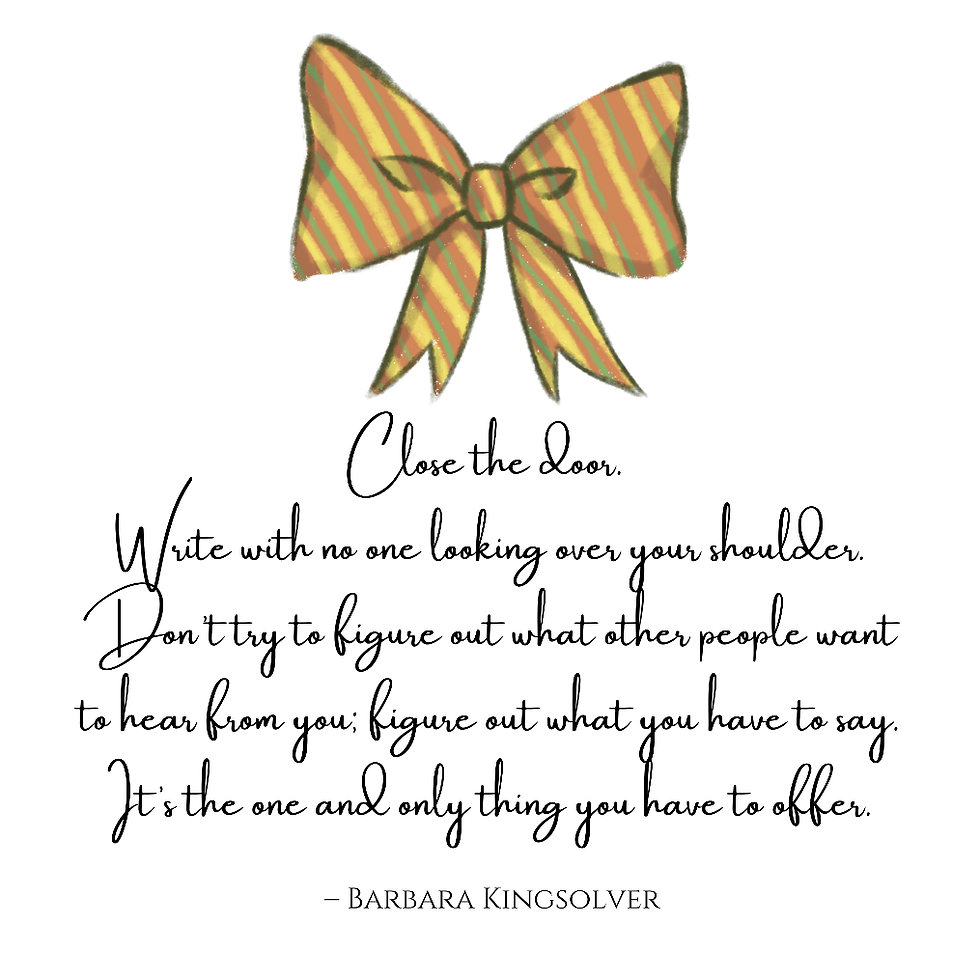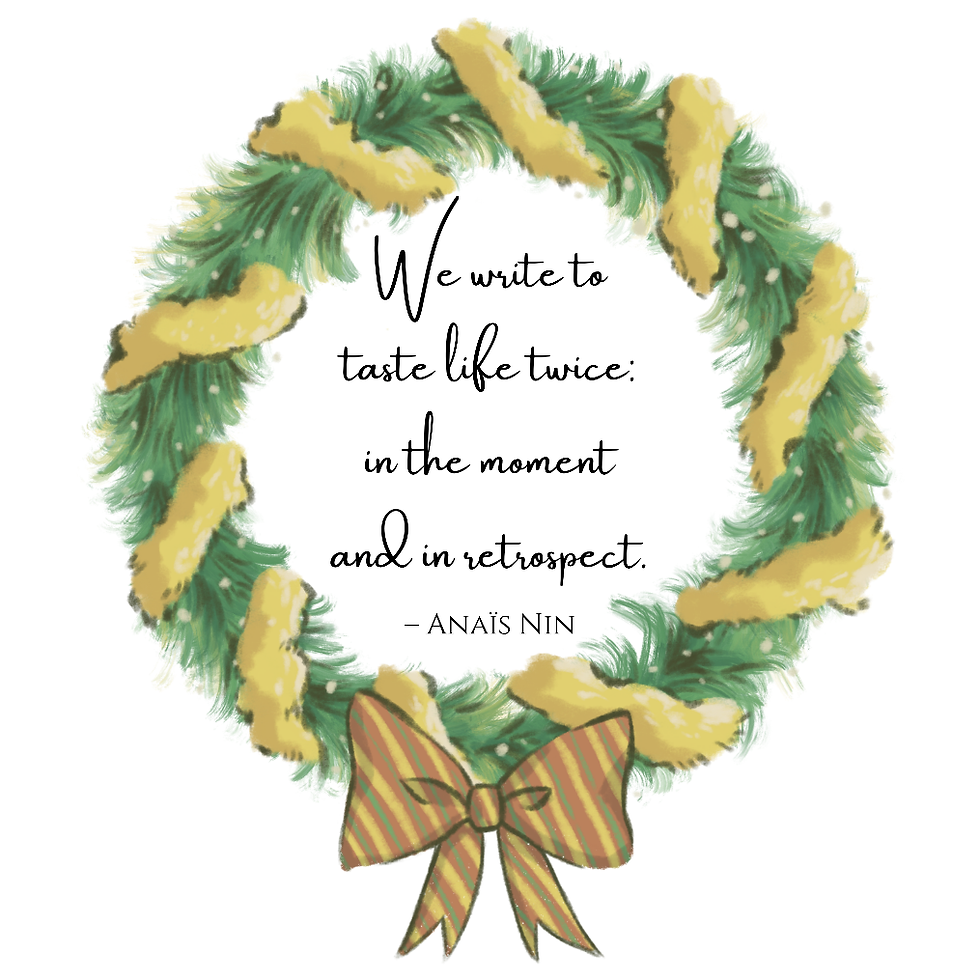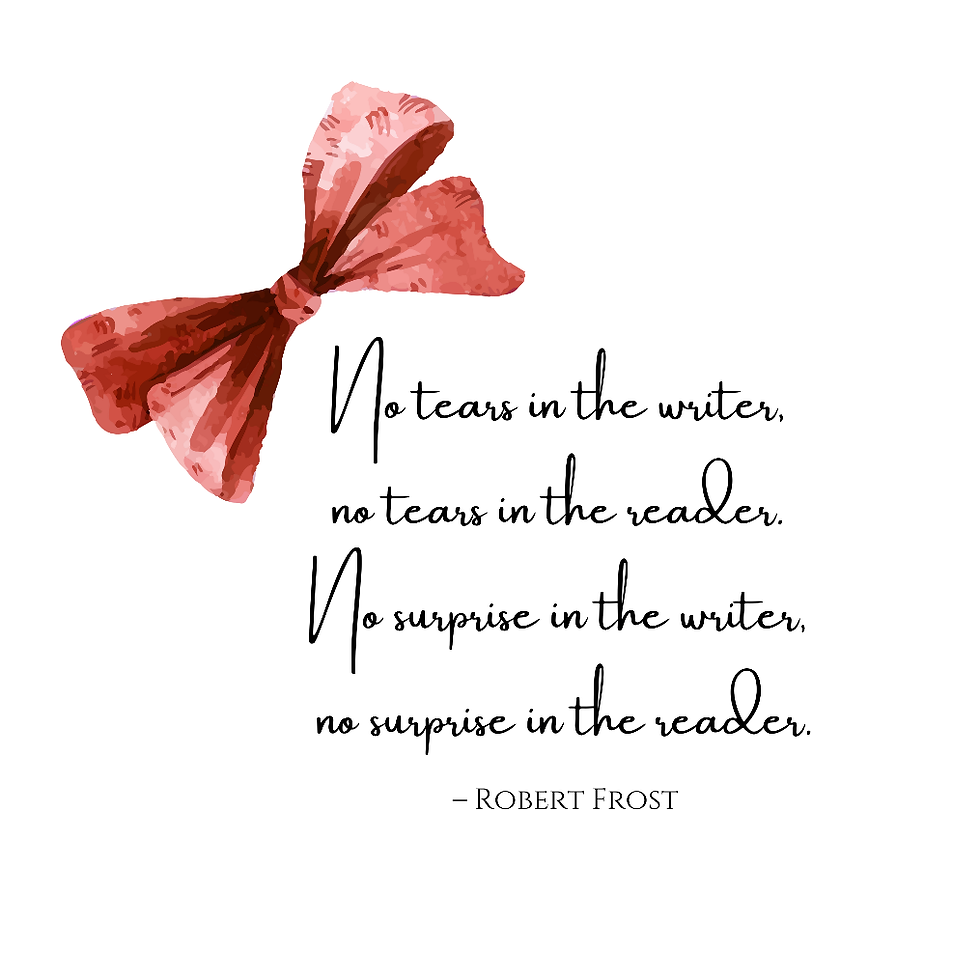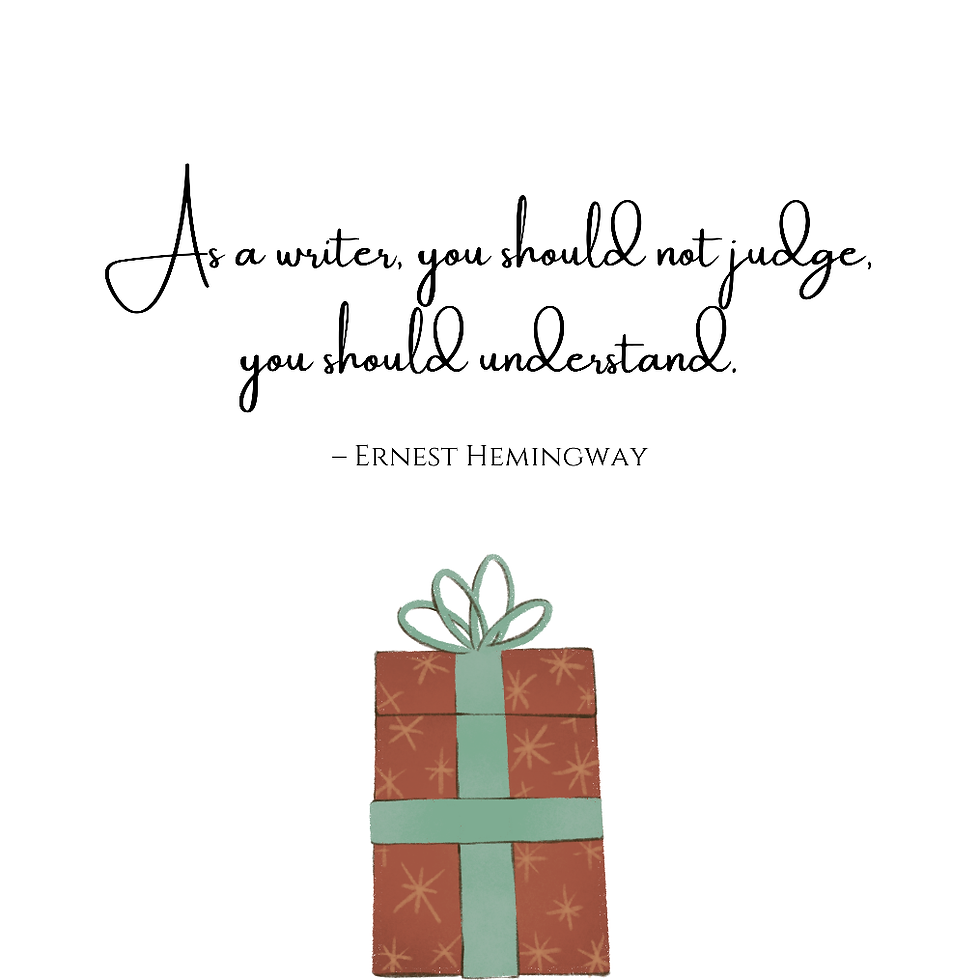10 Quotes to Guide Writers on a Creative Block
- Ukiyoto Publishing

- Dec 28, 2021
- 8 min read
Updated: Jan 13, 2022
‘Tis the Season for Ink-spiration
by Gabrielle Lopez

Empty coffee cups. A whole notebook of scribbles that do not make sense anymore. Hours of people-watching on a cold park bench. And yet—still nothing to write.
That’s life—or more specifically, that’s the writer’s life.
Sometimes, no matter how much caffeine we drink and no matter what we do or where we go to get ideas for our writing, the “ink-spirations” just run dry.
For a moment or two, we find ourselves not knowing what we want to say, how we want to say it, and why. We lose sight not just of our stories but also of ourselves as writers. We start to doubt our purpose for writing; we tend to ask ourselves, “What’s the point of this? Are people even going to listen to what I have to say? Why am I writing?” We also find our writing habits to be missing something—but what exactly?
Luckily, there are words of wisdom that can help us get through this—and who better to give us such than some of the most successful and renowned writers? Because yes, even they have had their fair share of writing crises.
So, from one writer to another, here is a gift of holiday hope—that we may once again find the light and the inspiration to write, especially in the upcoming new beginning, which can start not just by the New Year’s, but right now.
The Gift of Guidance

A politician, an inventor, a founding father of his country, Benjamin Franklin was also a writer. So, let’s take it from him when he says that the stories we write should be worth reading—and where better to get the inspirations for such than in our own experiences?
For those of us who are in a creative rut, wondering how to get ourselves out—or even if we are just looking for a nice starter to our writing—a good way to do such is by getting up from our seats and doing something else, even for just a while.
Try something new—it could be anything from doing a different exercise routine to eating an unfamiliar dessert, from hiking a mountain to learning a language, from doing pottery for the first time to making friends.
Even just doing something ordinary can help us get creative again: fixing our stuff, cleaning up, cooking a favorite meal, going out for a walk.
Immersing ourselves fully into our lives, especially in nature and cultures—not just for the sake of having something to write about, but for the sake of living them—helps refocus our perspectives, giving us a fresh take on the stories that we want to tell.

An important thing to ask ourselves when we are about to write—or when we find that we cannot write—is what we want to say in the first place. Forget the technicalities for a minute; forget the plot, the characters, the setting. Forget the people and their expectations and pressures. Instead, ask yourself right now: What message do I want to impart? What exactly do I mean to tell people?
Once we have the answers to these questions, the story naturally follows. By knowing our message, we understand the essence of our stories. And when we have the essence, every element of our narrative builds up on it and contributes to the very soul of our stories.
Knowing what we want to say—not what others want us to say—and then writing something centered on it keeps us going because then, our story becomes something that we are personally passionate about, something that we truly believe in.

As in any art form, in writing, we experience something twice: first, when we are in the moment itself and second, when we are through with it and simply looking back, capturing bits of our memory until we form a kaleidoscope of colors through the stories that we write.
The gift of art comes with the gift of retrospect: the ability to recall and to catch a certain moment, bottling it up into art forms for both ourselves and others to re-live. In the case of writers, we do this through our words: we tell our stories through messages in bottles for people to experience just as much as we have.

Now we know the secret to all the romance in Nora Roberts’s novels—the “Jewels of the Sun'' in her writing process that allow her to “Dance Upon the Air'' from the pages straight into our minds and hearts.
Contrary to popular belief, writing is not just about talent—and anyway, is anything ever just about that? As Nora said, it requires three Ds.
First, we have to have the drive or the determination to write. Being great at something is useless if we do not persevere through the challenges and setbacks that come our way. We will only go nowhere if we do not believe in our art and if we do not pursue this faith in our writing, giving up as we go.
Second, we need discipline. In order to get things done, we have to form writing habits that will sustain our passion for storytelling and motivate us to flourish as writers. The fire of creativity needs kindling; healthy, consistent practices keep the spark alive.
Lastly, we have to have the desire and the guts to write. In the very first place, do we even want to write? Are we passionate about the stories that we are telling? What exactly is the message that we want to give people? Once we have figured out what we want, we must follow it through with courage—the courage to dive in and just write.

They say that we cannot be writers if we are not readers. Indeed, classic author Robert Louis Stevenson said so. For him, we are split into two sides of ourselves as scribes: the reader half is our Dr. Jekyll, while the writer half is our Mr. Hyde. One cannot exist without the other because the two things are just halves of a whole.
We get what we know of writing from reading, which is why it is essential for us, writers, to keep the habit alive, even if it takes us countless stocked up books on our shelves.
Reading is a way for us to learn from other writers, and it is also a medium for our imaginations to work and to develop. Moreover, reading gives us the opportunity to experience things from various perspectives, which is valuable to our ability to understand our own stories and characters better—and when it comes to real life, reading helps us empathize better with ourselves and other people. Not to mention, reading is fun, and it takes us to worlds we never even knew could exist.

So far, based on the first five quotes, we have these as a guide to kickstart our writing.
We write better when we live our lives fully. We write naturally when we know what we want to say. We are artists who can capture moments and turn them into an infinity that others can experience. We need drive, discipline, and desire in order to write successfully and continuously. We are readers before we are writers.
Now, Robert Frost inspires us to go in-depth into our writing. He meant to say that as writers, it is our duty not just to tell a story but to experience it just as much. We have to really put our heart into it, discover it, feel it. Otherwise, our readers won’t be able to grasp the experience, either, because what we will end up having is a monotonous, empty vessel of a story.

Like we said earlier, reading allows us to see things from different points of view. When we read, we put ourselves in thousands of others’ shoes, experiencing more lives than a cat does in a single lifetime. Because of this, we are able to empathize better.
As writers who are also readers, it goes without saying that we should put this practice of empathy into writing—and even into living. With our inherent potential to understand people through the stories that we encounter and make, it is our duty to see things, as well as people, with a deeper knowledge, be it in fiction or in real life.

We said earlier that we need three Ds in writing: drive, discipline, and desire. We said that once we have figured out what we want with our story, we must follow it through with a courage to simply start—which is exactly what William Faulkner is now telling us.
Writing is a risk, much like any other art. It might turn out terribly, but there is also that undeniable possibility that our work can become something beautiful—a masterpiece that lives beyond ourselves, touching lives of people we have never even met, making impacts in lifetimes we will never get to live.
The point of it is to simply write. You will never know unless you do it.
Take a leap of faith with your story and write that first word, which will eventually become a first sentence until it grows into a first paragraph and then into a first chapter. After that, take another leap. And yet another. And another—until you are through.
By the time the story is over, take a leap again and share it with the world. If it does not turn out the way you wanted it to, take another leap and try again.

Besides having to know what we want to write, another important thing that we have to understand is the answer to the question, Why do we write?
Is it to inspire others, to help someone figure out a way to do something?
Is it so we can express ourselves in a way that we never have before?
Is it to simply make people feel that they are not alone in what they are experiencing?
Each one of us has our own reason for writing. What we need to do is to realize it, take it to heart, commit to it, and write with it so that no matter how many creative blocks we will experience along the way or no matter how much criticisms shout for us to stop—we never will because we have our purpose to hold onto as we keep writing.

As much as people need to breathe, we, writers, need to write. Telling stories is as inevitable for us as the sunsets.
When you have something to say, say it. Don’t bottle it.
Imagine if Shakespeare had decided to forego writing Romeo and Juliet, or if J K Rowling had given up Harry Potter—we would not be living in the same world today.
Every story is a step of change.
No matter how small, the effects that we make are there when we share our stories. When we write, we inevitably impact someone—be it a friend or a stranger, be it for a passing moment or for a lifetime.
So, write and share what you write. That way, our stories are there to be found by the people who simply look.
At the end of the day once we have written, we become changed persons ourselves because we have said what was needed. The chaos of an untold story becomes clarity, and life becomes immortalized once more into art.
The Gift of Words
Inks may run dry, and inspirations may fade at times.
But, at the end of the day, we have the gift of words. No matter how long it might take for us to regain the heart to tell stories, we will come back to writing.
As long as we keep trying and we continue believing in the power of our stories, we will always be writers.





My car has never looked as stunning as it does after attn2detail worked on it. Their luxury detailing made the inside spotless, and the ceramic coating gave the paintwork a flawless, glossy finish. https://www.attn2detail.info/ team’s dedication to quality and perfection shines through in every detail. Exceptional results that far exceeded my expectations.
bos288, slot thailand, bos288, bos288, bos288, bos288, bos288, bos288,
slot gacor, bos288, slot88, bos288, bos288, slot gacor, slot gacor, slot qris,
slot gacor, slot, raja168, slot gacor, raja168, slot, raja168, slot gacor, slot,
raja slot, slot qris, toto slot, slot dana, slot gacor, raja168, raja168,